 Dr Lisa Lamberte
Dr Lisa Lamberte
Email: l.e.lamberte@bham.ac.uk
Group leader: Prof Willem van Schaik
Lisa is a Research Fellow working in the group of Professor Willem van Schaik . Lisa has a strong background in molecular biology and is currently working to build her expertise in antimicrobial resistance and the infant gut microbiome. Her current research is understanding the spread of antimicrobial resistance genes in the preterm infant gut microbiome. Lisa was born and raised in Manila, Philippines. Much of her PhD work on intragenic transcription in the bacterial chromosome has been published on Nature Microbiology in 2017. In addition, she has developed a track record for communicating her research effectively to both a general and specialist audience - garnering awards such the Best Oral Talk at a conference, as well as being a finalist on the 3-Minute Thesis competition. Her current post as a BBSRC-funded Research Fellow involves understanding the spread of antimicrobial resistance genes in the preterm infant gut microbiome.
Qualifications
PhD in Biosciences, University of Birmingham, 2016
MSc in Microbiology, University of the Philippines-Diliman, 2009
BSc in Biology, De La Salle University-Manila 2006
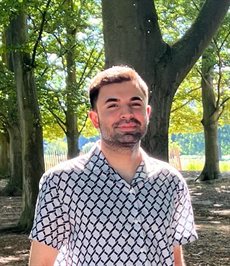 Dr Ilyas Alav
Dr Ilyas Alav
Email: i.alav.1@bham.ac.uk
Group leader: Dr Michelle Buckner
Ilyas is currently a research fellow with expertise in antibiotic resistance. His current research in Dr Michelle Buckner's group focus is on identifying novel compounds that inhibit the transmission of plasmids carrying antimicrobial resistance genes in clinically relevant Gram-negative bacteria. He is also interested in elucidating the mechanisms of action of anti-plasmid compounds. His previous research was focused on efflux-mediated resistance in the problematic food pathogen Salmonella enterica, with a particular focus on the multidrug resistance efflux pump AcrAB-TolC.
Ilyas Alav graduated from the University of Nottingham in 2016 with a bachelor’s degree in Biochemistry before gaining his master’s in Pharmacology from King’s College London in 2018. During this time, he developed an interest in antibiotic resistance. He joined Jessica Blair’s group at the University of Birmingham in 2017 to work on efflux-mediated antibiotic resistance, which he completed in 2022.
Following the completion of his PhD, he stayed at the University of Birmingham currently working with Dr Michelle Buckner as a research fellow to work on plasmid-mediated antimicrobial resistance in clinically relevant Gram-negative bacteria. His current work involves identifying compounds that inhibit plasmid transmission and their mechanisms of action and developing fluorescence-based reporter assays to monitor plasmid transmission
Qualifications
PhD in Microbiology and Infection, University of Birmingham, 2022
MSc in Pharmacology, King’s College London, 2018
BSc (Hons) in Biochemistry, University of Nottingham, 2016
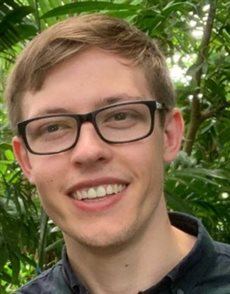 Dr Ross McInnes
Dr Ross McInnes
Email: r.mcinnes@bham.ac.uk
Group leader: Prof Willem van Schaik
Ross is a research fellow in the group of Professor Willem van Schaik within the Institute of Microbiology and Infection. His research focuses on antibiotic resistance and horizontal gene transfer in the opportunistic pathogen Enterococcus faecium. He is also interested in identifying the host bacteria of antibiotic resistance genes in the human gut microbiome.
Ross began his studies with a BSc (Hons) degree in Biochemistry and Microbiology at the University of Strathclyde. While at the University of Strathclyde he completed an ERASMUS summer project in the lab of Prof. Dr. Zoya Ignatova at the University of Hamburg.
As part of his doctoral training he completed an MRes between the University of Nottingham and the University of Birmingham in the labs of Dr Ed Bolt and Professor Willem van Schaik. He then continued his doctoral research in the lab of Professor Willem van Schaik where he used metagenomics, functional genomics and transcriptomics to investigate antibiotic resistance from a One Health perspective.
Ross is currently a research fellow in the lab of Professor Willem van Schaik where he uses genomics approaches such as Hi-C and nanopore long-read sequencing to link antibiotic resistance genes to their bacterial hosts.
Qualifications
PhD in Microbiology and Infection, University of Birmingham, 2022
MRes in Microbiology and Infection, University of Birmingham, 2018
BSc (Hons) in Biochemistry and Microbiology, University of Strathclyde, 2017
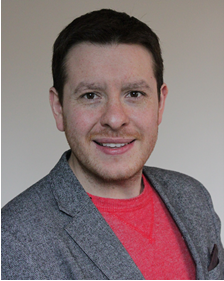
Dr Samuel Lara Reyna
Email: s.j.larareyna@bham.ac.uk
Group leader: Dr Eva Frickel
Samuel Lara is a researcher based in the College of Life and Environmental Sciences’ Institute of Microbiology and Infection. He is part of Dr Frickel’s laboratory which investigates mechanisms of human innate defence against pathogens, with a particular interest in Toxoplasma gondii and Salmonella typhimurium. Samuel’s research primarily focuses on innate immune cells and in studying intracellular mechanism involved in macrophage function. He studies IFNg-driven macrophage inflammation, metabolism and control of intracellular pathogens.
Samuel started his medical training at the faculty of Medicine UJED in Mexico, where he developed an interest in immunology. He obtained his BSc in Biology with Highest Honours and International Distinction at the University of Texas at San Antonio, with a concentration in immunology & microbiology. During his studies in Texas, Samuel gained fundamental research insight at Dr LeBaron’s laboratory of molecular biology. He was awarded a CONACyT scholarship in 2015 and moved to Birmingham, UK, where he obtained his MSc in Immunology and Immunotherapy at the University of Birmingham. He obtained experience in innate immunity with Professor Andy Clark, where he completed his MSc research project investigating glucocorticoid effects in macrophage function at the Institute of inflammation and ageing.
After his studies at the University of Birmingham, he was awarded the CONACyT/Leeds Graduate Fellowship to accomplish his doctoral studies in Medicine, at the University of Leeds. Samuel’s doctoral research focused on understanding the dysregulated molecular mechanisms of macrophages in autoinflammatory disorders. He studied cystic fibrosis and the dysregulated pathways affecting macrophages in this disease, with interest in inflammation, ER stress and cellular metabolism. He obtained his PhD in Medicine in 2020 at the University of Leeds under the supervisor of Dr Sinisa Savic, Professor Daniel Peckham, and Professor Michael McDermott.
Qualifications
PhD in Medicine (Immunology), University of Leeds, 2020
MSc in Immunology and Immunotherapy, University of Birmingham, 2016
BSc in Molecular Biology, The University of Texas at San Antonio, 2014
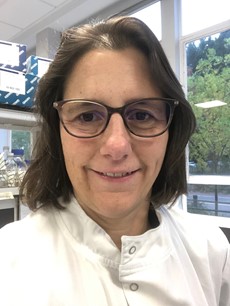
Dr Georgina Lloyd
Email: g.s.lloyd@bham.ac.uk
Group leader: Prof Chris Thomas
Georgina is a Research Fellow in the School of Biosciences and Institute of Microbiology and Infection working with Professor Chris Thomas on developing a novel plasmid displacement technology to eliminate antibiotic resistance genes.
Georgina graduated from the University of York with a degree in Biology before moving to the University of Leeds to carry out a PhD in Biochemistry and Molecular Biology. Georgina then moved to the University of Birmingham in 1995 for a postdoctoral position with Professor Steve Busby investigating activation of bacterial promoters by RNA polymerase and has remained in Birmingham ever since! Since 2009 she has also worked with Del Besra and Luke Alderwick on the biochemical characterisation of pivotal enzymes involved in mycobacterial peptidoglycan biosynthesis, and with Laura Piddock on identifying lead molecules for development as inhibitors of multidrug efflux in Gram negative bacteria and is currently working with Chris Thomas in the field of plasmid biology.
Qualifications
PhD in Biochemistry and Molecular Biology, University of Leeds, 1995
BSc (Hons) in Biology, University of York, 1991
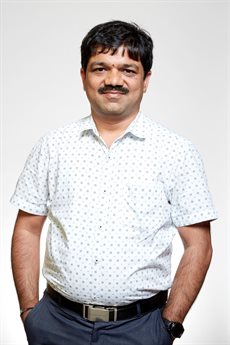 Dr Santosh Kumar
Dr Santosh Kumar
Email: s.k.cm@bham.ac.uk
Group leader: Prof Pete Lund
Santosh is currently a research fellow in Prof Del Besra group, his long standing research interest has been to develop novel therapeutic regimens to tuberculosis. Tuberculosis is a major global problem causing about 2 million deaths annually. A key protein in the infection process is chaperonin Cpn60.1, produced by the bacterium that causes tuberculosis. Santosh demonstrated that this protein undergoes unusual post-translational modifications. To decipher precise role of chaperonins in tuberculosis, Santosh teamed up with Dr. Pete Lund, who is a world expert in Mycobacterial chaperone research. For faster research output, Santosh established a zebrafish infection model to dissect the role of the chaperonins in mycobacterial infections. His research findings at IMI bear the potential to develop novel non-antibiotic related treatments for tuberculosis.
Santosh joined IMI as a Newton International Fellow (2017-2019), sponsored by the Royal Society, UK, to work with Dr. Peter Lund. His research findings during this time enabled a successful BBSRC responsive mode grant, in which he is currently a Co-Investigator. Earlier, Santosh did Ph. D. in the Centre for DNA Fingerprinting and Diagnostics, Hyderabad, India and worked as Post-Doc in the University of Birmingham, USA and National Centre for Cell Science, Pune, India.
Qualifications
PhD in Biotechnology, Centre for DNA Fingerprinting and Diagnostics, Hyderabad, India. 2009
MSc (Biochemistry), Sri Krishnadevaraya University, India. 2002
BSc (Biochemistry), Sri Krishnadevaraya University, India. 2000
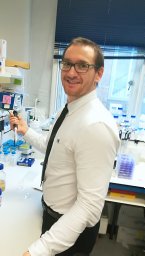 Dr Jerzy Samolej
Dr Jerzy Samolej
Email: j.r.samolej@bham.ac.uk
Group leader: Prof Jason Mercer
Jerzy is a Research Fellow in Prof Jason Mercer's group, his work focuses on the interactions between the vaccinia virus and the host cell.
Qualifications
PhD in Molecular Biology and Virology
MSci Biochemistry
MA Psychology-Sociology
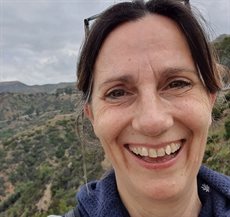 Dr Barbara Clough
Dr Barbara Clough
Email: b.clough@bham.ac.uk
Group leader: Dr Eva Frickel
Barbara is a Research Fellow working in Dr Eva Frickel’s laboratory within the Institute of Microbiology and Infection (IMI), in the College of Life and Environmental Sciences. Barbara works on the cell intrinsic immune response to intracellular pathogens in human cells. She is particularly interested in the interferon gamma-driven control of Toxoplasma gondii at the parasite/cell interface, using high-content fluorescent microscopy to discover the mechanisms of infection control in different cell types.
Barbara started her research career at the University of Liverpool where she gained a BSc in Medical Cell Biology and Biochemistry and was awarded the Bromley Undergraduate Scholarship for academic achievement. She became interested in infectious disease research during work experience at the Liverpool School of Tropical Medicine. This interest was pursued in Dr Iain Wilson’s laboratory at the National Institute for Medical Research, London where she obtained a PhD in the biophysical regulation of malarial parasite invasion into red blood cells. Following her PhD, she was awarded a Leverhume Trust fellowship to study red cell membrane deformability and malarial invasion. Her interest in malaria continued into a post-doctoral fellowship at St Mary’s Hospital Medical School, where she helped establish a new malaria laboratory and studied the pathogenesis of malaria with Professor Geoffrey Pasvol. Barbara’s research focused on the cytoadherence phenotypes in malarial parasites and their relationship to red blood cell invasion. Barbara joined Dr Eva Frickel’s group at the National Institute for Medical Research in 2012 as a Senior Investigator Scientist and started research into cell-intrinsic immunity to Toxoplasma gondii, focusing on interferon gamma (IFNg)-driven host defence to the parasite. She discovered a parasite strain-specific and host ubiquitin-dependent pathway controlling Toxoplasma and continued investigating the mechanism behind this pathway when the laboratory moved to the Francis Crick Institute in 2016. As a Principal Laboratory Research Scientist, Barbara used fluorescence microscopy, proximity biotinylation and mass spectrometry techniques to uncover novel host defence proteins co-operating in Toxoplasma control. Barbara is currently a postdoctoral research fellow working with Dr Eva Frickel at the Institute of Microbiology and Infection at the University of Birmingham. Her research into innate host response to Toxoplasma is focused on infection in retinal cells as a model for ocular toxoplasmosis.
Qualifications
PhD in Parasitology (Malaria), National Institute for Medical Research, London, 1991
BSc (Hons) in Medical Cell Biology and Biochemistry, University of Liverpool, 1987
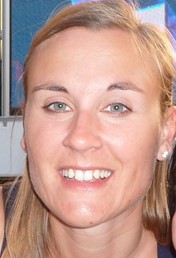
Dr Maria Laura Ciusa
Email: m.ciusa@adf.bham.ac.uk
Group leader: Prof Laura Piddock
Maria Laura is a Research associate working in the group of Emeritus Professor Laura Piddock at the Institute of Microbiology and Infection. Maria Laura’s research activity has been mainly focused on detecting and characterizing human microbial pathogens from biological samples and studying antimicrobial resistance in bacteria, except for a slight diversion in food microbiology, studying microbial composition of traditional dairy products. She has a strong background on molecular biology approaches as well as on conventional microbiology techniques and, most recently, on bacterial flow cytometry. Her current research is understanding the efflux biology of Pseudomonas aeruginosa MexCD-OprJ and export of antibiotics. Maria Laura was born and raised in the Italian island of Sardinia. She obtained her BSc and MSc in Biological Sciences at the University of Cagliari (Italy), and then she was trained as clinical scientist in Microbiology and Virology at the University of Cagliari Medical School. From there, she moved in Tuscany (Italy) and obtained her PhD in Medical Biotechnologies at the University of Siena in 2012. Maria Laura’s research activity has been mainly focussed on detecting and characterizing microbial pathogens from human biological samples and studying antimicrobial resistance in bacteria. During her PhD she investigated biocides resistance in Staphylococcus aureus, in both clinical isolates and lab generated mutants.
At Birmingham University, she studied the transmission and stability of AMR plasmids and the bacterial response to efflux inhibition in Gram-negative bacteria. She currently works in understanding the efflux biology of Pseudomonas aeruginosa MexCD-OprJ.
Qualifications
PhD in Medical Biotechnologies, University of Siena (Italy), 2012
Specialist in Microbiology and Virology, University of Cagliari (Italy), 2005
MSc in Biological Sciences, University of Cagliari (Italy), 2001
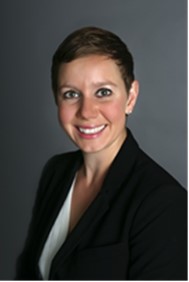 Dr Heather Mercer
Dr Heather Mercer
Email: h.mercer@bham.ac.uk
Group leader: Prof Jason Mercer
Heather Mercer is a postdoctoral researcher fellow based in the College of Life and Environmental Sciences’ Institute of Microbiology and Infection. She is a part of Prof Jason Mercers research group which investigates Vaccina virus’s interactions with the host cell. Heather’s research focuses on the role of ERK- mediated mechanochemical waves in the spread of Vaccinia virus within the host cell.
Heather continued her education at the University of New Mexico investigating host immune responses during Toxoplasma gondii infection. Her PhD research specifically focused on the parasite dense granule protein GRA24 and its role in MyD88- independent activation of p38 MAPK. She was awarded a PhD in 2021 from the University of New Mexico under the supervision of Dr. Eric Denkers. Heather began her training at New Mexico State University (NMSU) in her hometown of Las Cruces, New Mexico. During her time at NMSU she became interested in host pathogen interactions and received her BSc in Biology.
Qualifications
PhD in Biology, University of New Mexico, 2021
MSc in Biology, University of New Mexico, 2019
BSc in Biology, New Mexico State University, 2013